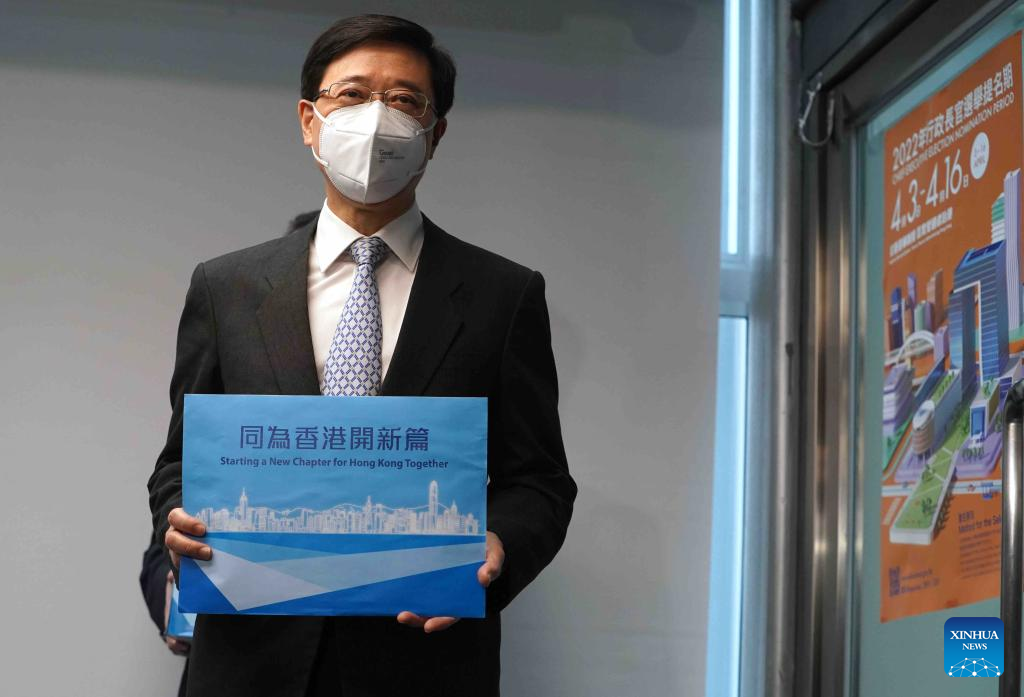
Victoria Harbour in south China's Hong Kong, December 6, 2021. /CFP
Victoria Harbour in south China's Hong Kong, December 6, 2021. /CFP
Editor's note: Tian Feilong is an associate professor at Beihang University's Law School and director of the Chinese Association of Hong Kong and Macao Studies. The article reflects the author's views and not necessarily those of CGTN.
The election for the chief executive of China's Hong Kong Special Administrative Region (HKSAR), which was postponed due to the pandemic resurgence, is being carried out in right earnest in accordance with the statutory procedures. This is the third election under the new electoral system, and the latest one after the electoral reform.
The basic institutional objective of the new electoral system is to achieve the goal of "patriots governing Hong Kong," which contains two jurisprudential elements: firstly, candidates must be legally qualified "patriots"; secondly, the fair competition among patriots must elect capable "governors." The requirements of the new electoral system are therefore clear and unambiguous: all participants in the democratic electoral process must be both loyal and competent.
Looking at the nominations from April 3 to April 16, there are several noteworthy details. Firstly, the incumbent Chief Executive Carrie Lam announced that she would not seek re-election and would instead focus on COVID-19 control and returning to family life, which was her personal decision.
Secondly, former chief secretary for administration of the HKSAR government John Lee announced his resignation and stood for election, winning high recognition from the patriotic establishment, Hong Kong society and the central government for his high degree of loyalty and strong ability to get things done. He won 786 nomination votes and became the only candidate who passed the qualification process.
Thirdly, other contenders who had the will to run either did not obtain enough nomination votes and withdrew from the race or voluntarily chose to give up the race in favor of Lee.
Fourthly, in his election manifesto, Lee proposed three basic policy views of aiming for results, enhancing competitiveness across the board and laying a solid foundation for Hong Kong, which are concise, clear and to the point.
The democratic legitimacy of an election should be evaluated on the basis of the legitimacy of the corresponding electoral legal system and electoral procedures, and should not be prejudged or denigrated by any selective bias or discriminatory criteria. The democratic legitimacy of the chief executive election can be fully proven.
Firstly, the democratic legitimacy of the electoral system is well-established. The new electoral system was born out of the reflection on the 2019 legislative amendment fiasco and the "instigation of violent acts by district councils," with the institutional objective of effectively closing the loopholes in the electoral system and ensuring that genuine patriots govern Hong Kong. Therefore, the new electoral system is institutionally legitimate under the "one country, two systems" policy framework.
Secondly, the electoral procedures are legitimate. The election of the new chief executive is conducted in accordance with the requirements of the new electoral system. There is no violation of laws and regulations, and it is a legal and effective electoral operation.
Thirdly, the high number of nomination votes for Lee shows that his political background and ability to get things done were recognized by more than half members of the Hong Kong Election Committee. He has an overwhelming campaign advantage, and the electoral system should certainly allow the person with the advantage to succeed in the race.

John Lee, former chief secretary for administration of the Hong Kong Special Administrative Region government, submits the completed nomination forms in person to the returning officer for election of the HKSAR's sixth-term chief executive, in Hong Kong, April 13. 2022. /Xinhua
John Lee, former chief secretary for administration of the Hong Kong Special Administrative Region government, submits the completed nomination forms in person to the returning officer for election of the HKSAR's sixth-term chief executive, in Hong Kong, April 13. 2022. /Xinhua
Fourthly, other candidates have the democratic right to compete fairly, but there are procedures and thresholds in all elections, and their failure to secure enough nominations or withdrawal on their own volition is also a result of the application of the electoral system, and should be respected and understood.
In terms of his background and campaign goals, Lee can be a qualified chief executive who is able to meet the needs of security governance and innovation-driven development in line with Hong Kong's transition from the first half of the "one country, two systems" to the second half. Not fully constructed, the security governance system in Hong Kong is still a sticky issue regarding the rule of law.
In 2020, the central government enacted the Hong Kong National Security Law, which put in place a legal system to safeguard national security, but this legislation is no substitute to the constitutional responsibility under Article 23 of Hong Kong Basic Law, nor does it exhaustively cover all acts and activities that endanger national security of Hong Kong.
From the perspective of Article 23 of Hong Kong Basic Law and the actual situation endangering national security in Hong Kong, espionage, the expansion of terrorist activities, cyber-crimes and crimes hurting financial security are all detrimental to China's national security interests.
However, the existing laws are porous in design. Lee's pledge to take forward the "legislation under Article 23" is a commitment to the rule of law by building Hong Kong's security governance system. We have reason to believe that he will be able to shoulder this responsibility and complete it on schedule.
Parallel to security governance is the innovation-driven development of Hong Kong. The central government has repeatedly stated that development is the solution to all problems in Hong Kong. The development of Hong Kong is not merely the "modernization" of an ordinary economy, but the innovation-driven and equitable development of an advanced economy.
On the one hand, the new development paradigm must feature innovative elements of advanced technology and industries, providing strategic support for the transformation and upgrading of Hong Kong's economy; on the other hand, the new development paradigm should be socially beneficial, characterized by fair income distribution and social justice with broad participation of members from all walks of life.
The major impetus from the Northern Metropolis and the unlimited potential promised by the integration into the national development strategy are at the forefront of visions for the development of Hong Kong. All these visions need to be translated into realities under the leadership of a wise and powerful chief executive and his governing team.
"One country, two systems" is a special constitutional arrangement for China's reform and opening up and for the country to ride on the tide of globalization. It's a creative institutional design that integrates the core values of peace and development into the HKSAR system.
Under this institutional framework, security is the bottom line and development is the priority, and there is no possibility of sacrificing development for security. The relationship between security and development is dialectical, yet the two are unified in purpose.
If Hong Kong fails to achieve stability and order and to reinstate the authority of the rule of law, it is unlikely to attract global investors and talented people, and it will be difficult for the city to assume the functions of an international financial center. By getting safer, Hong Kong can establish a stronger foundation and unleash greater dynamism for development.
The electoral system reform and the election of the new chief executive are meant to lay a solid institutional foundation for Hong Kong's development and governance, thus having strong democratic legitimacy.
We believe that the new chief executive and his team will be able to serve Hong Kong and the country well under the guidance of the new electoral system and the fundamental principle of "patriots governing Hong Kong," establish a sound security governance system for Hong Kong, ensure and guide Hong Kong's closer interconnection with the mainland and the world, and make positive contributions to the prosperity and stability of Hong Kong.
(If you want to contribute and have specific expertise, please contact us at opinions@cgtn.com. Follow @thouse_opinions on Twitter to discover the latest commentaries in the CGTN Opinion Section.)

